Collection of "the Books I loved"
From Osho′s Book The Buddha:
Common sense carries fragments of knowledge. It knows that the people who are compassionate, people of heart, have a certain wisdom which is not knowledge, a certain insight, a certain intuitiveness which cannot be taught. They can see things, feel things. They are sensitive to things which are not available to the mind. So people start thinking that there are possibilities of the heart having wisdom. But they don′t know that the heart is your emptiness.
And out of your emptiness a clarity, a transparency arises which can see things which you cannot intellectually infer. This is wisdom. To make it complete, it has to be said, "The wisdom of the empty heart." The heart, as the physiologist knows it, is just a blood-pumping system. Out of your heartbeats no wisdom can arise. Have you ever felt any wisdom arising from your heartbeats? Has any doctor ever heard some wisdom while checking your heartbeats through his stethoscope? This heart is not the one we mean when we are talking about the emptiness of the heart. Actually, we are talking about throwing away all the contents of the mind. Then, the no-mind itself becomes your heart. It is not a physiological thing. It is your no-mind - no prejudice, no knowledge, no content. Just purity, simple silence, and the no-mind can be called the empty heart. It is only a question of expression. What you want to choose, you can choose: the wisdom of the empty heart, or the wisdom of no-mind - they are equivalent. When you are in deep meditation, you feel a great serenity, a joy that is unknown to you, a watchfulness that is a new guest. Soon this watchfulness will become the host. The day the watchfulness becomes the host, it remains twenty-four hours with you. And out of this watchfulness, whatever you do has a wisdom in it. Whatever you do shows a clarity, a purity, a spontaneity, a grace.
(Osho - The Buddha: The Emptiness Of The Heart)
And out of your emptiness a clarity, a transparency arises which can see things which you cannot intellectually infer. This is wisdom. To make it complete, it has to be said, "The wisdom of the empty heart." The heart, as the physiologist knows it, is just a blood-pumping system. Out of your heartbeats no wisdom can arise. Have you ever felt any wisdom arising from your heartbeats? Has any doctor ever heard some wisdom while checking your heartbeats through his stethoscope? This heart is not the one we mean when we are talking about the emptiness of the heart. Actually, we are talking about throwing away all the contents of the mind. Then, the no-mind itself becomes your heart. It is not a physiological thing. It is your no-mind - no prejudice, no knowledge, no content. Just purity, simple silence, and the no-mind can be called the empty heart. It is only a question of expression. What you want to choose, you can choose: the wisdom of the empty heart, or the wisdom of no-mind - they are equivalent. When you are in deep meditation, you feel a great serenity, a joy that is unknown to you, a watchfulness that is a new guest. Soon this watchfulness will become the host. The day the watchfulness becomes the host, it remains twenty-four hours with you. And out of this watchfulness, whatever you do has a wisdom in it. Whatever you do shows a clarity, a purity, a spontaneity, a grace.
BUDDHA
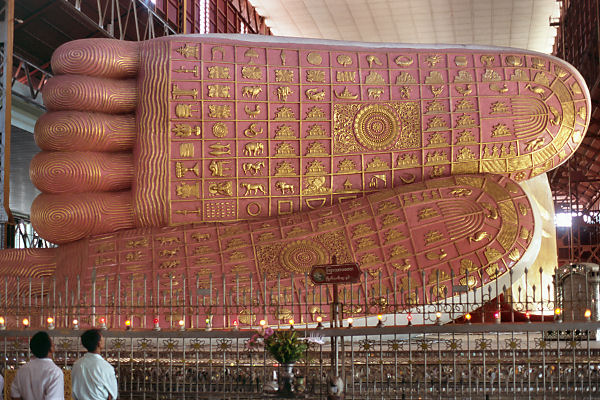 Buddha′s feet in the Chaukhtatgyi Paya On each of the soles of the Buddha′s feet are 108 sacred symbols Yangon City Yangon |
Even I myself could not believe that I had not included Gautama the Buddha′s Dhammapada. Gautam Buddha was sitting there silently in the last row. I love the man as I have loved nobody else. I have been speaking on him throughout my whole life. Even speaking on others I have been speaking on him. Take note of it, it is a confession. I cannot speak on Jesus without bringing Buddha in; I cannot speak on Mohammed without bringing Buddha in. Whether I mention him directly or not that′s another matter. It is really impossible for me to speak without bringing Buddha in. He is my very blood, my bones, my very marrow. He is my silence, also my song. When I saw him sitting there I remembered. I cannot even apologize, it is beyond apologizing. Dhammapada literally means ′the path of truth′, or even more accurately ′the footprints of truth′. Do you see the contradiction?
Coming in going out the waterfowl leaves no trace behind, nor it needs a guide. Truth is unspeakable. There are no footprints. Birds flying in the sky don′t leave any footprints... and buddhas are birds of the sky. But buddhas always speak in contradictions, and it is beautiful that at least they speak. They cannot speak without contradicting themselves, they cannot help it. To speak of truth is to contradict yourself. Not to speak is again to contradict, because even when you are trying not to speak, you know that your silence is nothing but an expression, without words maybe, but an expression all the same.
Buddha gave the name Dhammapada to his greatest book, and there are contradictions upon contradictions. He is so full of contradictions that believe me, except me nobody can defeat him. Of course he would enjoy being defeated by me, just as a father once in a while enjoys being defeated by his own child. The child sitting on his father′s chest victorious, and the father has simply allowed him to win. All the buddhas allow themselves to be defeated by those who love them. I allow my disciples to defeat me, to go beyond me. There cannot be anything more joyous than seeing a disciple transcend me.
Buddha begins with the very name Dhammapada - that′s what he is going to do: he is going to say the unsayable, to utter the unutterable. But he uttered the unutterable so beautifully that Dhammapada is like an Everest. There are mountains and mountains, but not one rises to the height of Everest.
(Osho in Books I Have Loved)
Coming in going out the waterfowl leaves no trace behind, nor it needs a guide. Truth is unspeakable. There are no footprints. Birds flying in the sky don′t leave any footprints... and buddhas are birds of the sky. But buddhas always speak in contradictions, and it is beautiful that at least they speak. They cannot speak without contradicting themselves, they cannot help it. To speak of truth is to contradict yourself. Not to speak is again to contradict, because even when you are trying not to speak, you know that your silence is nothing but an expression, without words maybe, but an expression all the same.
Buddha gave the name Dhammapada to his greatest book, and there are contradictions upon contradictions. He is so full of contradictions that believe me, except me nobody can defeat him. Of course he would enjoy being defeated by me, just as a father once in a while enjoys being defeated by his own child. The child sitting on his father′s chest victorious, and the father has simply allowed him to win. All the buddhas allow themselves to be defeated by those who love them. I allow my disciples to defeat me, to go beyond me. There cannot be anything more joyous than seeing a disciple transcend me.
Buddha begins with the very name Dhammapada - that′s what he is going to do: he is going to say the unsayable, to utter the unutterable. But he uttered the unutterable so beautifully that Dhammapada is like an Everest. There are mountains and mountains, but not one rises to the height of Everest.
- The Dhammapada as .pdf file in a translation by Thomas Byrom
- A site with The Dhammapada
- Osho has commented on The Dhammapada in a set of 12 books
- Buddha′s The Diamond Sutra
- Subhoda: Right-Mindfulness
HERMANN HESSE
He was not an enlightened one, what to say about those who have gone beyond enlightenment. He was just an ordinary human being, but in a poetic flight he has written one of the greatest books in the world, Siddhartha.
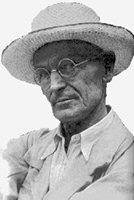 Siddhartha is really the name of Gautama the Buddha, given to him by his parents. He became known as Gautam Buddha. Gautama was his family name; Buddha simply means ′the awakened′. Siddhartha was the real name given by his parents in consultation with the astrologers. It is a beautiful name. Siddhartha also means ′one who has attained to the meaning′. Siddha means ′one who has attained′ artha means ′the meaning′. Combined together Siddhartha means ′one who has come to the meaning of life′. The astrologers, the parents, the people who gave him this name must have been wise people – if not enlightened, at least wise... worldly-wise at least.
Siddhartha is really the name of Gautama the Buddha, given to him by his parents. He became known as Gautam Buddha. Gautama was his family name; Buddha simply means ′the awakened′. Siddhartha was the real name given by his parents in consultation with the astrologers. It is a beautiful name. Siddhartha also means ′one who has attained to the meaning′. Siddha means ′one who has attained′ artha means ′the meaning′. Combined together Siddhartha means ′one who has come to the meaning of life′. The astrologers, the parents, the people who gave him this name must have been wise people – if not enlightened, at least wise... worldly-wise at least.
Hermann Hesse′s Siddhartha repeats the story of Buddha in a different way, but in the same dimension, with the same meaning. It is unbelievable that Hermann Hesse could write it but could not become a siddha himself. He remained a poor writer - yes, a Nobel prizewinner, but that does not matter that much. You cannot give a Nobel prize to a buddha; he will laugh and throw it away. But the book is immensely beautiful, and I include it.
(Osho in Books I Have Loved)
 Siddhartha is really the name of Gautama the Buddha, given to him by his parents. He became known as Gautam Buddha. Gautama was his family name; Buddha simply means ′the awakened′. Siddhartha was the real name given by his parents in consultation with the astrologers. It is a beautiful name. Siddhartha also means ′one who has attained to the meaning′. Siddha means ′one who has attained′ artha means ′the meaning′. Combined together Siddhartha means ′one who has come to the meaning of life′. The astrologers, the parents, the people who gave him this name must have been wise people – if not enlightened, at least wise... worldly-wise at least.
Siddhartha is really the name of Gautama the Buddha, given to him by his parents. He became known as Gautam Buddha. Gautama was his family name; Buddha simply means ′the awakened′. Siddhartha was the real name given by his parents in consultation with the astrologers. It is a beautiful name. Siddhartha also means ′one who has attained to the meaning′. Siddha means ′one who has attained′ artha means ′the meaning′. Combined together Siddhartha means ′one who has come to the meaning of life′. The astrologers, the parents, the people who gave him this name must have been wise people – if not enlightened, at least wise... worldly-wise at least.Hermann Hesse′s Siddhartha repeats the story of Buddha in a different way, but in the same dimension, with the same meaning. It is unbelievable that Hermann Hesse could write it but could not become a siddha himself. He remained a poor writer - yes, a Nobel prizewinner, but that does not matter that much. You cannot give a Nobel prize to a buddha; he will laugh and throw it away. But the book is immensely beautiful, and I include it.
- More comments of Osho on Hermann Hesse′s Siddharta
- Herman Hesse′s Siddhartha online
- Siddharta as pdf-file.
VIMALKIRTI
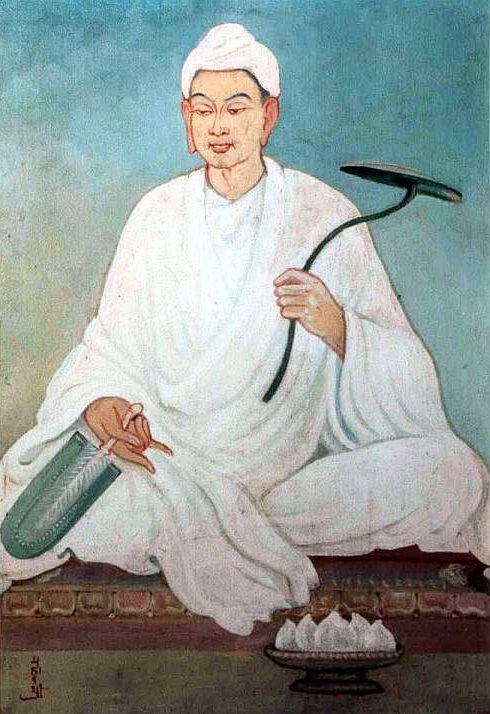
Our Vimalkirti was not the only Vimalkirti; in fact I had given him the name because of this Vimalkirti of whom I am going to talk to you. His statements are called Vimalkirti Nirdesh Sutra. Nirdesh Sutra means ′guidelines.′
Vimalkirti was one of the most wonderful men; even a Buddha could be jealous of this man. He was a disciple of Buddha, but never became a disciple formally, he was never initiated by Buddha outwardly. And he was such a terrible man that all Buddha′s disciples were afraid of him. They never wanted him to become a disciple. Just to see him on the way, or to greet him, was enough for him to say something shocking. To shock was his method. Gurdjieff would have loved him - or who knows, even Gurdjieff may have been shocked. The man was really terrible, a real man.
It is said he was sick and Buddha asked Sariputta to go and see the old man and ask about his health. Sariputta said, "I have never said no to you, but this time I say it, and I say it emphatically: No! I don′t want to go. Send somebody else. That man is really terrible. Even on his deathbed he will create trouble for me. I don′t want to go."
Buddha asked everybody, and nobody was ready to go except one man, Manjushree, the first of Buddha′s disciples to become enlightened. He went, and that is how this book came to be created. It is a dialogue. Our Vimalkirti was given the name because of this man. The original Vimalkirti was dying on his bed, and Manjushree was asking him questions, or rather answering his questions. that′s how the Vimalkirti Nirdesh Sutra was born - a really great work. Nobody seems bothered about it because it is not a book of any particular religion. It is not even a book of the Buddhists, because he was never a formal disciple of Buddha. People pay so much respect to the form that they forget the spirit. I recommend the book to all true seekers. They will find a mine of diamonds.
(Osho in Books I Have Loved)
Vimalkirti was one of the most wonderful men; even a Buddha could be jealous of this man. He was a disciple of Buddha, but never became a disciple formally, he was never initiated by Buddha outwardly. And he was such a terrible man that all Buddha′s disciples were afraid of him. They never wanted him to become a disciple. Just to see him on the way, or to greet him, was enough for him to say something shocking. To shock was his method. Gurdjieff would have loved him - or who knows, even Gurdjieff may have been shocked. The man was really terrible, a real man.
It is said he was sick and Buddha asked Sariputta to go and see the old man and ask about his health. Sariputta said, "I have never said no to you, but this time I say it, and I say it emphatically: No! I don′t want to go. Send somebody else. That man is really terrible. Even on his deathbed he will create trouble for me. I don′t want to go."
Buddha asked everybody, and nobody was ready to go except one man, Manjushree, the first of Buddha′s disciples to become enlightened. He went, and that is how this book came to be created. It is a dialogue. Our Vimalkirti was given the name because of this man. The original Vimalkirti was dying on his bed, and Manjushree was asking him questions, or rather answering his questions. that′s how the Vimalkirti Nirdesh Sutra was born - a really great work. Nobody seems bothered about it because it is not a book of any particular religion. It is not even a book of the Buddhists, because he was never a formal disciple of Buddha. People pay so much respect to the form that they forget the spirit. I recommend the book to all true seekers. They will find a mine of diamonds.
PAUL REPS
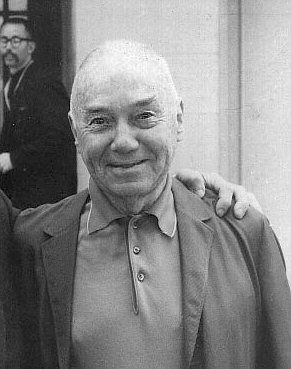
Paul Reps′ Zen Flesh, Zen Bones is a great work – not original in that he has not created it, but although not original it is far more significant than just a translation. It is a category in itself. In one way it is original, in another way a translation. It is a translation of old Zen anecdotes and original writing. I know because I have seen almost all the books written on and about Zen, and nothing compares to Paul Reps′ book. He has caught a glimpse. He has the same flavor as Basho or Rinzai. The man is still alive somewhere in California. He has in this small book not only collected Zen anecdotes but also Vigyan Bhairav Tantra – the one hundred and twelve sutras of Shiva to Parvati, his beloved, in which Shiva talks about all the keys possible. I cannot conceive that there can be anything more to meditation than Vigyan Bhairav Tantra. One hundred and twelve keys are enough - they seem to be enough; one hundred and thirteen will not look like a right number. One hundred and twelve looks really esoteric, beautiful. This book is very small, you can carry it in your pocket; it is a pocketbook. But you can also carry the Kohinoor in your pocket... although the Kohinoor is studded in the British crown, and you cannot carry that in your pocket.
But the most beautiful thing about Paul Reps is that he has not added a single word of his own - which is incredible. He has simply translated, just translated - and not only translated, but he has brought the flower of Zen to the English language. That flower is not found in any other English writer on Zen. Even Suzuki has not been able to do it, because he was a Japanese. Although enlightened he could not bring the flavor of his enlightenment to his English books. Suzuki′s English is beautiful but very unenlightened, perhaps electrified but absolutely unenlightened.
Paul Reps has done an almost impossible task, being an American, and yet, I repeat, and yet getting the full flavor of Zen. And not only getting it for himself but bringing it in Zen Flesh, Zen Bones for the whole world too. The world should remain grateful to him forever, although he is not an enlightened person. That is why I say he has done an almost impossible task.
(Osho in Books I Have Loved)
But the most beautiful thing about Paul Reps is that he has not added a single word of his own - which is incredible. He has simply translated, just translated - and not only translated, but he has brought the flower of Zen to the English language. That flower is not found in any other English writer on Zen. Even Suzuki has not been able to do it, because he was a Japanese. Although enlightened he could not bring the flavor of his enlightenment to his English books. Suzuki′s English is beautiful but very unenlightened, perhaps electrified but absolutely unenlightened.
Paul Reps has done an almost impossible task, being an American, and yet, I repeat, and yet getting the full flavor of Zen. And not only getting it for himself but bringing it in Zen Flesh, Zen Bones for the whole world too. The world should remain grateful to him forever, although he is not an enlightened person. That is why I say he has done an almost impossible task.
- See also: The Zen Manifesto 3
CHRISTMAS HUMPHRIES
By the way, the book I am going to mention is Christmas Humphries′ Zen Buddhism. Originally he wanted to call it Go On, Go On - as a translation of Charaiveti, Charaiveti - or Walk On, Walk On. But after all an Englishman is an Englishman; he finally dropped the idea and called the book Zen Buddhism. The book is beautiful, but the title is ugly because Zen has nothing to do with any ′ism′, Buddhism or any other. Zen Buddhism is not right as a title. Just Zen would have been enough.
Humphries writes in his diary that he had chosen Charaiveti, Charaiveti as his first preference for the title, but then he thought it was too long. Walk On, Walk On... Go On, Go On. He changed the title and made it something ugly: Zen Buddhism. But the book is beautiful. It has introduced millions of Westerners to the world of Zen. It has served tremendously.
This man Humphries was a disciple of D.T.Suzuki, and he has served the master as nobody else has, particularly in the West. He remained devoted to Suzuki his whole life. Gudia was saying to me yesterday that she had told Devageet that "if you live with Osho like me even for only one month, then you will know what it is – hard." I know it is certainly hard. To be with an enlightened person is hard – and to be with one who has gone beyond that is even harder.
But Humphries proved to be really a disciple; he remained true and loyal and obedient to Suzuki to the very end of Suzuki′s life and his own. He did not waver for a single moment. You can find that unwavering spirit in his book.
(Osho in Books I Have Loved)
Humphries writes in his diary that he had chosen Charaiveti, Charaiveti as his first preference for the title, but then he thought it was too long. Walk On, Walk On... Go On, Go On. He changed the title and made it something ugly: Zen Buddhism. But the book is beautiful. It has introduced millions of Westerners to the world of Zen. It has served tremendously.
This man Humphries was a disciple of D.T.Suzuki, and he has served the master as nobody else has, particularly in the West. He remained devoted to Suzuki his whole life. Gudia was saying to me yesterday that she had told Devageet that "if you live with Osho like me even for only one month, then you will know what it is – hard." I know it is certainly hard. To be with an enlightened person is hard – and to be with one who has gone beyond that is even harder.
But Humphries proved to be really a disciple; he remained true and loyal and obedient to Suzuki to the very end of Suzuki′s life and his own. He did not waver for a single moment. You can find that unwavering spirit in his book.
KAPLEAU
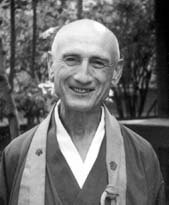
There are so many books standing before me that it is very hard to choose, but I choose Kapleau′s Three Pillars of Zen. Many people have written about Zen - including Suzuki, who knew it the most - but Three Pillars of Zen is the most beautiful book written about Zen. Remember my emphasis, about, because Kapleau has no experience of it. In fact, that makes it even more wonderful: that without any experience, just from studying books and visiting monasteries in Japan, he wrote a masterpiece.
There is only one thing I want to say to Kapleau: in Zen there are not three pillars, not even a single pillar. Zen has no pillars. It is not a temple, it is pure no-thing-ness. It needs no pillars at all. If he publishes the book again he should change the title.
Three Pillars of Zen looks good, but it is not true to the spirit of Zen. But the book is written in a very scientific way. Those who want to understand Zen intellectually cannot find a better book.
(Osho in Books I Have Loved)
There is only one thing I want to say to Kapleau: in Zen there are not three pillars, not even a single pillar. Zen has no pillars. It is not a temple, it is pure no-thing-ness. It needs no pillars at all. If he publishes the book again he should change the title.
Three Pillars of Zen looks good, but it is not true to the spirit of Zen. But the book is written in a very scientific way. Those who want to understand Zen intellectually cannot find a better book.
- Roshi Philip Kapleau
- In his book Three Pillars of Zen Philip Kapleau mentions "The Natural Koan".
BODHIDHARMA
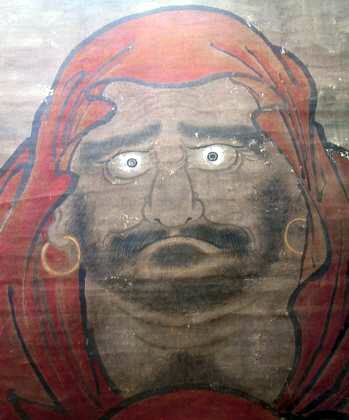
The Notes of the Disciples of Bodhidharma. When I talk of Gautam Buddha I always forget Bodhidharma, perhaps because I feel as if I have included him in his master, Buddha. But no, that is not right; Bodhidharma stands on his own. He was a great disciple, so great that even the master could be jealous of him. He himself did not write a word, but a few of his disciples, unknown because they did not mention their names, wrote some notes of Bodhidharma′s words. These notes, though few, are as precious as the Kohinoor. The word Kohinoor, do you know, means the light of the world. Noor means the light, kohi means of the world. If I had to describe anything as Kohinoor, yes, I would indicate towards those few notes by the anonymous disciples of Bodhidharma.
(Osho in Books I Have Loved)
- See also: The Zen Manifesto 1
- Bodhidharma on the internet
- Osho talks on The Notes of Bodhidharma in his book The White Lotus
SOSAN
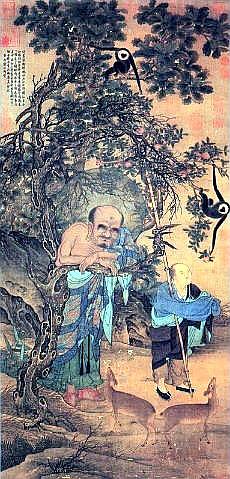
Now my work begins. What a joke! The joke of all jokes is that Sosan, the Chinese sage, was knocking at the door of my consciousness. These mystics are too much. You can never know at what moment they will start knocking at your doors. You are making love to your girlfriend, and Sosan comes and starts knocking. They come all the time, anytime, they do not believe in any etiquette. And what was he saying to me? He was saying, "Why haven′t you included my book?" My God, that is true! I have not included his book in my list for the simple reason that his book contains all that is. If I include his book then nothing else is needed, then no other book is needed. Sosan is enough unto himself. His book is called Hsin Hsin Ming. Hsin has to be written not like the English ′sin′ but h-s-i-n. Now you know the Chinese: what a way to commit a sin! Hsin... Hsin Hsin Ming. Okay Sosan, I include your book too. That becomes my first book today. I am sorry, it should have been the first from the very beginning, but I have already talked about twenty others. It doesn′t matter. Hsin Hsin Ming whether I said it or not, is the foremost, the first.
...
Hsin Hsin Ming is such a small book that if Sosan had known that one day, after him, Gurdjieff would write a book called All And Everything, he would have laughed, because that title belongs to his own book. And Gurdjieff had to write one thousand pages, yet the few words of Sosan are far more penetrating, far more significant. They go directly to your heart.
...
Sosan′s book is so small, just like Isa Upanishad, and far more significant. When I say that my heart breaks, because I would like Isa to be the ultimate book, but what can I do? Sosan has defeated it. Tears come to my eyes because ISA is defeated, and also because Sosan is victorious. The book is so small, you can write it on your palm; but if you try, please remember... the left hand. don′t write it on the right hand, that will be sacrilege. They say, "Right is right, and left is wrong." I say left is right, and right is wrong, because the left represents all that is beautiful in you, and Sosan can enter only through the left. I know because I have entered thousands of hearts through the left hand, through the left side, through their feminine, their yin - I mean the Chinese yin - I have never been able to enter anybody through his yang. The very word is enough to prevent anybody: yang. It seems to say "Keep away!" It says "Stop. Do not enter here. Keep off! Beware of the dog!" The right is like that. The right belongs to the wrong side of your consciousness. It is useful, but only as a servant. It should never be the master.
So if you write Sosan′s Hsin Hsin Ming, write it on your left palm. It is such a beautiful book, each word is golden. I cannot conceive of a single word that could be deleted. It is exactly that which is needed, required, to say the truth. Sosan must have been a tremendously logical man, at least while he was writing his Hsin Hsin Ming. I have spoken about it and I have never loved speaking more. The greatest moments of my speaking were when I was speaking on Sosan. Speaking and silence together... speaking yet not speaking, because Sosan can be explained only through no-speaking. He was not a man of words, he was a man of silence. He spoke just the minimum.
(Osho in Books I Have Loved)
So if you write Sosan′s Hsin Hsin Ming, write it on your left palm. It is such a beautiful book, each word is golden. I cannot conceive of a single word that could be deleted. It is exactly that which is needed, required, to say the truth. Sosan must have been a tremendously logical man, at least while he was writing his Hsin Hsin Ming. I have spoken about it and I have never loved speaking more. The greatest moments of my speaking were when I was speaking on Sosan. Speaking and silence together... speaking yet not speaking, because Sosan can be explained only through no-speaking. He was not a man of words, he was a man of silence. He spoke just the minimum.
- Hsin Hsin Ming - verses on the faith mind of Seng T′san (Sosan) 3rd Zen PatriarchTranslated from the original Chinese by Richard B. Clarke.
- The Mind of Absolute Trust by Seng T′san (Sosan)
HUANG PO
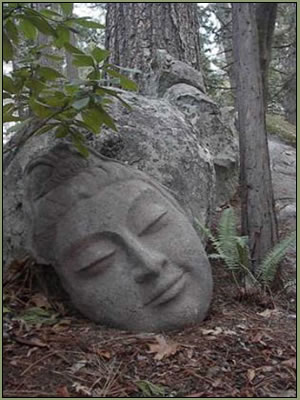
A book by another Chinese, The Book Of Huang Po. It is a small book, not a treatise, just fragments. Truth cannot be expressed in a treatise, you cannot write a Ph.D. on it. A Ph.D. is a degree that should be given to the fools.
Huang Po writes in fragments. On the surface they seem to be unconnected, but they are not. You have to meditate and then you can find the connection. It is one of the most meditative books ever written.
In English The Book Of Huang Po is translated in the English way as The Teachings Of Huang Po. Even the title is wrong. People like Huang Po don′t teach. There is no teaching in it. You have to meditate, to be silent, to understand it.
(Osho in Books I Have Loved)
Huang Po writes in fragments. On the surface they seem to be unconnected, but they are not. You have to meditate and then you can find the connection. It is one of the most meditative books ever written.
In English The Book Of Huang Po is translated in the English way as The Teachings Of Huang Po. Even the title is wrong. People like Huang Po don′t teach. There is no teaching in it. You have to meditate, to be silent, to understand it.
HUI HAI
(Hui Hai is known as Hyakujo in Japan)
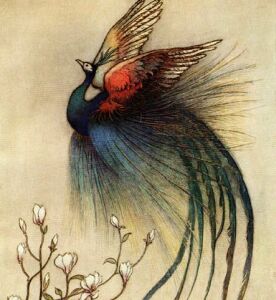
The Book Of Hui Hai. Again in English it is translated as The Teachings Of Hui Hai. These poor Englishmen, they think there is nothing more in life than teaching. These Englishmen are all teachers. And be aware of Englishwomen; otherwise you will get caught with a schoolteacher!
Hui Hai and Huang Po are both masters. They impart, they don′t teach. Hence I call it The Book Of Hui Hai, although you will not find it in the libraries. In the libraries you will find The Teachings Of Hui Hai.
(Osho in Books I Have Loved)
Hui Hai and Huang Po are both masters. They impart, they don′t teach. Hence I call it The Book Of Hui Hai, although you will not find it in the libraries. In the libraries you will find The Teachings Of Hui Hai.
- The Zen Teaching of Hui Hai: On Sudden Illumination
- Hui Hai′s Zen Teaching of Instantaneous Awakening
D.T. SUZUKI
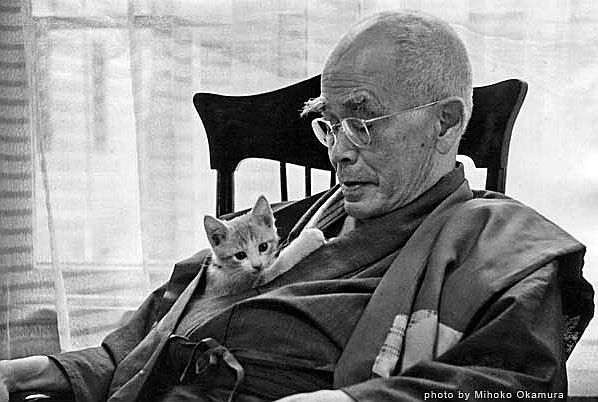
The man I am going to mention is not recognized as enlightened because there was nobody to recognize him. Only an enlightened person can recognize another. This man′s name is D.T. Suzuki. This man has done more than anybody else in the modern world to make meditation and Zen available.
Suzuki worked for his whole life to introduce to the West the innermost core of Zen. ′Zen′ is only the Japanese pronunciation of the Sanskrit word dhyana – meditation. Buddha never used Sanskrit; he hated it, for the simple reason that it had become the language of the priests, and the priest is always in the service of the devil. Buddha used a very simple language, that used by his people in the valley of Nepal. The name of his language is Pali.
In Pali dhyana is pronounced ch′ana. Simple, illiterate, ordinary people cannot appreciate the subtleties of any language. They make it according to themselves. It is like a stone rolling down the river, it becomes round. that′s how every word used by the people starts having a beautiful roundness, a particular simplicity. Dhyana is difficult for the ordinary people to pronounce; they pronounced it ch′ana. When it reached China, from ch′ana it became ch′an, and when it traveled to Japan it became Zen. You can see - it happens everywhere - people always make words simple.
...Suzuki worked for his whole life to introduce to the West the innermost core of Zen. ′Zen′ is only the Japanese pronunciation of the Sanskrit word dhyana – meditation. Buddha never used Sanskrit; he hated it, for the simple reason that it had become the language of the priests, and the priest is always in the service of the devil. Buddha used a very simple language, that used by his people in the valley of Nepal. The name of his language is Pali.
In Pali dhyana is pronounced ch′ana. Simple, illiterate, ordinary people cannot appreciate the subtleties of any language. They make it according to themselves. It is like a stone rolling down the river, it becomes round. that′s how every word used by the people starts having a beautiful roundness, a particular simplicity. Dhyana is difficult for the ordinary people to pronounce; they pronounced it ch′ana. When it reached China, from ch′ana it became ch′an, and when it traveled to Japan it became Zen. You can see - it happens everywhere - people always make words simple.
This man [D.T. Suzuki] has done so much service for humanity that no one can transcend him. His work is immense. The whole world is indebted to him and it will always remain so. Suzuki should be a household word. It is not... I am saying that it should be. Very few people are aware, and those who are aware it is their responsibility to spread their awareness far and wide.
(Osho in Books I Have Loved)
HUBERT BENOIT
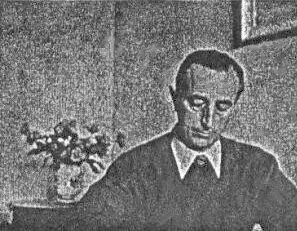
I am going to introduce a Frenchman to you. You will be surprised. Inside you are asking yourself, "A Frenchman? And being listed by Osho along with Pythagoras, Heraclitus, Suzuki? Has he really gone mad?" Yes, I have never been sane, not for these last twenty-five years, or a little more. Before that I too was sane, but thank God - again remember it is just an expression, because there is no God, only godliness. I don′t forget to mention it because there is every possibility that even my followers, my disciples, will start worshipping God - or me as a God. There is no God, there never was. Nietzsche is wrong when he says, "God is dead!" - not because God is not dead, but because he was never alive so how can he be dead? To be dead one has to first fulfill the condition of being alive. That is where Sartre is wrong: he agrees with Nietzsche. I say "Thank God!" - I used the word because there is no other word to use in its place. But it is only a word, contentless. "Thank God" simply means it is good, that it is beautiful.
...
The book is Hubert Benoit′s Let Go. It should be on the bookshelf of every meditator. Nobody has written so scientifically and yet so poetically. It is a contradiction, but he has managed it. Hubert Benoit′s Let Go is the best that has come out of the modern Western world. It is the best book of the century as far as the West is concerned. I am not counting the East.
(Osho in Books I Have Loved)
It is very rare that a man, a single man, produces two masterpieces, but that is the case with Hubert Benoit. I don′t know how the French pronounce it... and they are so snobbish about their pronunciation, and I am so sloppy! But I don′t care - what does it matter if a word here and there is mispronounced? My whole life I have been mispronouncing. This man Hubert Benoit - I have mentioned his first book, Let Go. In fact that was his second book. Before writing Let Go he had written another book called The Supreme Doctrine. I would like to include that too; otherwise I will feel really sad not to have mentioned it. It is a tremendously beautiful book but very difficult to read, and much more difficult to understand. But Benoit tried his best to make it as simple as possible.
(Osho in Books I Have Loved)
- Read also Osho′s comments on Hubert Benoit in The Zen Manifesto.
- Hubert Benoit′s psychological studies in Zen thought
MAHAKASHAPA
This man is known only to very few people, for the simple reason he never wrote and he never spoke: Mahakashyapa. All that is known of him is this anecdote. One day, Buddha came to his morning discourse with a lotus flower in his hand. He sat silently looking at the flower, not saying a single word. The assembly of ten thousand sannyasins was bewildered. This was unheard of. In the first place Buddha, who had never before come with anything, comes with a lotus flower; secondly, he used to speak immediately, but today minutes and hours have passed, and he is just looking at the flower. Many must have thought he must have gone mad. Only one man did not agree. He laughed. That man was Mahakashyapa. Buddha raised his eyes, laughed, and called Mahakashyapa to him, gave him the flower, and told the assembly that the sermon was over, saying, "I have given to you what you are entitled to, and I have given to Mahakashyapa what he deserves, and rightly so. I have talked to you for years in words, and you never understood. Today I have spoken in silence, and the laughter of Mahakashyapa has shown that he has understood." In this mysterious way the successor was found. Mahakashyapa became Buddha′s successor. A strange way.
The disciples of Mahakashyapa have written a few things about him which can be called his book. But really he has not written them, nor have his disciples signed them. They are anonymous. But whatsoever was written is of immense beauty. A few fragments, just like pieces of the full moon: if you can put them together there will be the full moon again. The secret to put them together is meditation. The tradition that followed Mahakashyapa is Zen. He is the first patriarch of Zen, of dhyana. Strange... not even Buddha, but Mahakashyapa is the first. ... Because Buddha spoke for forty years, Mahakashyapa never spoke; the only noise that he ever made was that of laughter. If you can call it speaking, that′s another matter. In a way it is speaking - it is saying that the whole existence is a joke. It is saying to Buddha, "What a joke!" The moment you understand that the whole existence is a joke, you have understood. There is no other understanding, no other enlightenment. Everything else is pseudo.
(Osho in Books I Have Loved)
The disciples of Mahakashyapa have written a few things about him which can be called his book. But really he has not written them, nor have his disciples signed them. They are anonymous. But whatsoever was written is of immense beauty. A few fragments, just like pieces of the full moon: if you can put them together there will be the full moon again. The secret to put them together is meditation. The tradition that followed Mahakashyapa is Zen. He is the first patriarch of Zen, of dhyana. Strange... not even Buddha, but Mahakashyapa is the first. ... Because Buddha spoke for forty years, Mahakashyapa never spoke; the only noise that he ever made was that of laughter. If you can call it speaking, that′s another matter. In a way it is speaking - it is saying that the whole existence is a joke. It is saying to Buddha, "What a joke!" The moment you understand that the whole existence is a joke, you have understood. There is no other understanding, no other enlightenment. Everything else is pseudo.
HUI NENG
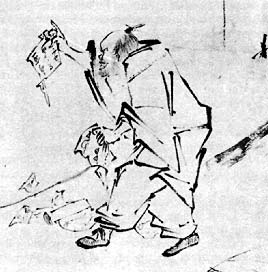
Hui Neng, the Chinese successor to Bodhidharma. The Teachings Of Hui Neng are as yet unknown, and untranslated outside Japan. Hui Neng is one of the pinnacles, the very crescendo a man can rise to. Hui Neng does not say much; he only gives hints, just a few hints. But they are enough. Like footprints, if you can follow you will reach.
What he says is essentially not different from Buddha or Jesus, but the way he says it is his own, authentically original. He says it in his own way, and that proves he is not a parrot, not a pope or a priest.
Hui Neng can be summarized very easily, but can only be realized by those who can risk all. He can be summarized very easily because all that he says is: Do not think; be. But to realize it one will need many lives, unless one is utterly intelligent; then, this very moment, herenow, it can become a reality in you. It is already a reality in me, why can′t it become a reality in you? Except you, nobody is preventing it.
(Osho in Books I Have Loved)
What he says is essentially not different from Buddha or Jesus, but the way he says it is his own, authentically original. He says it in his own way, and that proves he is not a parrot, not a pope or a priest.
Hui Neng can be summarized very easily, but can only be realized by those who can risk all. He can be summarized very easily because all that he says is: Do not think; be. But to realize it one will need many lives, unless one is utterly intelligent; then, this very moment, herenow, it can become a reality in you. It is already a reality in me, why can′t it become a reality in you? Except you, nobody is preventing it.
- Hui Neng is called Eno in Japanese.
- See also: Hui Neng
- Hui Neng on the internet
- Another site featuring Hui Neng′s Platform Sutra
RINZAI
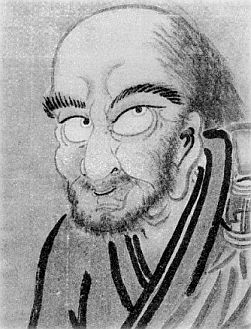
Just now, by the way, I mentioned the name Rinzai. My sixth is his Sayings, the collection of his sayings.
...
Rinzai... his Chinese name is Lin Chi; in Japanese it is Rinzai. I choose the Japanese, Rinzai. Rinzai looks more beautiful, more aesthetic.
The Sayings of Rinzai are just dynamite. For instance he says: You fools, you followers of Buddha, renounce him! Unless you renounce him you will not find him. Rinzai loved Buddha that′s why he said this. He also said: Before you use the name Gautam Buddha, remember that that name is not the reality. The buddha outside in the pagoda is not the real buddha. It is within you... of whom you are completely unaware, of whom you have never heard. That is the real buddha. Get rid of the outer buddha so you can get the inner.
Rinzai says: There is no doctrine, no teaching, no Buddha. And remember, he was not an enemy of Buddha but a follower, a disciple. It was Rinzai who took the flower of Zen away from China to Japan. He transmitted the spirit of Zen to the Japanese language, and not only to the language but to the culture itself, to flower arrangement, to pottery, to gardening and whatnot. One man, one single man, transformed the whole life of a nation.
(Osho in Books I Have Loved)
The Sayings of Rinzai are just dynamite. For instance he says: You fools, you followers of Buddha, renounce him! Unless you renounce him you will not find him. Rinzai loved Buddha that′s why he said this. He also said: Before you use the name Gautam Buddha, remember that that name is not the reality. The buddha outside in the pagoda is not the real buddha. It is within you... of whom you are completely unaware, of whom you have never heard. That is the real buddha. Get rid of the outer buddha so you can get the inner.
Rinzai says: There is no doctrine, no teaching, no Buddha. And remember, he was not an enemy of Buddha but a follower, a disciple. It was Rinzai who took the flower of Zen away from China to Japan. He transmitted the spirit of Zen to the Japanese language, and not only to the language but to the culture itself, to flower arrangement, to pottery, to gardening and whatnot. One man, one single man, transformed the whole life of a nation.
ALAN WATTS
 I am going to include another man, Alan Watts, with all his books. I have loved this man immensely. I have loved Buddha for different reasons; I have loved Solomon for a different reason. They are enlightened, Alan Watts is not. He is an American... not a born American, that′s his only hope; he just emigrated there. But he has written tremendously valuable books.
I am going to include another man, Alan Watts, with all his books. I have loved this man immensely. I have loved Buddha for different reasons; I have loved Solomon for a different reason. They are enlightened, Alan Watts is not. He is an American... not a born American, that′s his only hope; he just emigrated there. But he has written tremendously valuable books.The Way of Zen should be counted as one of the most important; This Is It is a tremendous work of beauty and understanding - and from a man who is yet unenlightened; hence it is more appreciable. When you are enlightened, whatsoever you say is beautiful; it has to be. But when you are not enlightened and groping in the dark, and yet can find a small window of light, that′s tremendous, fantastic.
Alan Watts was a drunkard, but still he was very close. He was once an ordained Christian priest - what a misfortune! - but he renounced it. Very few people have the guts to renounce the priesthood, because it provides so many things of the world. He renounced all that and became almost a hobo. But what a hobo! - it reminds one of Bodhidharma, Basho, or Rinzai.
Alan Watts′ The Book. I have been saving it. Alan Watts was not a buddha, but he could be one day. He has moved closer to it. The Book is tremendously important. It is his testament, his whole experience with Zen masters, Zen classics. And he is a man of tremendous intelligence; he was also a drunkard. Intelligence plus wine have really created a juicy book. I have loved The Book and I have saved it for the last.
(Osho in Books I Have Loved)
I love one statement of one of the most important people of the West, Alan Watts. He was a drunkard, but he was the man who introduced to the West the most essential parts of Zen and enlightenment. He wrote not as a scholar, but as a master. Before he was dying, he was still drinking and a disciple asked him, "Have you ever thought... if Buddha had seen you drinking alcohol, what do you think he would have thought about it?"
Alan Watts said, "There is no problem. I always drink in an enlightened way."
The question is not what you do, the question is how you do it. Yes, I accept Alan Watts′ statement. There is a possibility of a man to drink alcohol in an enlightened way. Enlightenment should not have any limits. And it should not have a particular formula, a particular pattern that you have to follow.
Enlightenment should be an individual experience - the most individual experience, incomparable and unique to everybody. Once this is understood, all the clouds that surround you with darkness start dispersing.
(Osho in Om Mani Padme Hum #17)
Alan Watts said, "There is no problem. I always drink in an enlightened way."
The question is not what you do, the question is how you do it. Yes, I accept Alan Watts′ statement. There is a possibility of a man to drink alcohol in an enlightened way. Enlightenment should not have any limits. And it should not have a particular formula, a particular pattern that you have to follow.
Enlightenment should be an individual experience - the most individual experience, incomparable and unique to everybody. Once this is understood, all the clouds that surround you with darkness start dispersing.
- See also: The Zen Manifesto 4
- Alan Watts′ Laughing Meditation
- Alan Watts was not a Zen Buddhist, not really
BASSUI
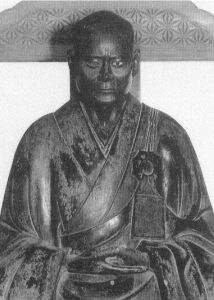
Note:
Bassui (1327-1387) is a Japanese Zen Master encountered in Philip Kapleau′s Three Pillars of Zen. While Kapleau′s book was meant to feature his teacher, Yasutani-roshi, Bassui stands out as truly "a man come back from the dead." The advice he returns to again and again in his teaching is shown in the following quote:
What is the master [within you] who at this very moment is seeing and hearing? If you reply, as most do, that it is Mind or Nature or Buddha or one′s Face before birth or one′s Original Home or Koan or Being or Nothingness or Emptiness or Form-and-Color or the Known or the Unknown or Truth or Delusion, or say something or remain silent, or regard it as Enlightenment or Ignorance, you fall into error at once. What is more, if you are so foolhardy as to doubt the reality of this master, you bind yourself though you use no rope. However much you try to know it through logical reasoning or to name or call it, you are doomed to failure. And even though all of you becomes one mass of questioning as you turn inward and intently search the very core of your being, you will find nothing that can be termed Mind or Essence. Yet should someone call your name, something from within will hear and respond. Find out this instant who it is!
If you push forward with your last ounce of strength at the very point where the path of your thinking has been blocked, and then, completely stymied, leap with hands high in the air into the tremendous abyss of fire confronting you - into the ever-burning flame of your own primordial nature - all ego-consciousness, all delusive feelings and thoughts and perceptions will perish with your ego-root and the true source of your Self-nature will appear. You will feel resurrected, all sickness having completely vanished, and will experience genuine peace and joy.
If you push forward with your last ounce of strength at the very point where the path of your thinking has been blocked, and then, completely stymied, leap with hands high in the air into the tremendous abyss of fire confronting you - into the ever-burning flame of your own primordial nature - all ego-consciousness, all delusive feelings and thoughts and perceptions will perish with your ego-root and the true source of your Self-nature will appear. You will feel resurrected, all sickness having completely vanished, and will experience genuine peace and joy.
- Osho answers a question about Bassui in his book Zen The Path of Paradox.
BUDAI / HOTEI the Laughing Buddha
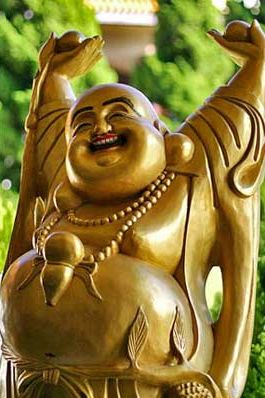
The Laughing Buddha is called Budai in China and Hotei in Japan. Start becoming a little more alert and watch things, and you will be surprised. Life is mysterious, unexplainable - life is absurd. You cannot prove anything for or against.
Tertullian says: I believe in God because God is absurd - Credo quia absurdum. Why do I believe in God? - because God is absurd! No logic can prove him, no logic can disprove him. It is a love affair. And life is very hilarious because it is very ridiculous too. If you become a little alert you will find love, light, laughter, everywhere!
Tertullian says: I believe in God because God is absurd - Credo quia absurdum. Why do I believe in God? - because God is absurd! No logic can prove him, no logic can disprove him. It is a love affair. And life is very hilarious because it is very ridiculous too. If you become a little alert you will find love, light, laughter, everywhere!
It is said that when Hotei attained enlightenment he started laughing. He lived at least thirty years afterwards; he continued laughing for thirty years. Even in sleep his disciples would hear him giggling. His whole message to the world was laughter; he would go from one town to another just laughing. He would stand in one marketplace, then in another, just laughing, and people would gather. His laughter had something of the beyond - a Buddha′s laughter. He is known in Japan as ′the laughing Buddha′.
His laughter was so contagious that whosoever heard it would start laughing. Soon the whole marketplace would be laughing; crowds would gather and laugh and they would ask him, "Just give us a few instructions."
He would say, "Nothing more, this is enough. If you can laugh, if you can laugh totally, it is meditation."
Laughter was his device. It is said many people became enlightened through Hotei′ s laughter. That was his only meditation: to laugh and help people laugh. Just watch life, and you will be surprised.
His laughter was so contagious that whosoever heard it would start laughing. Soon the whole marketplace would be laughing; crowds would gather and laugh and they would ask him, "Just give us a few instructions."
He would say, "Nothing more, this is enough. If you can laugh, if you can laugh totally, it is meditation."
Laughter was his device. It is said many people became enlightened through Hotei′ s laughter. That was his only meditation: to laugh and help people laugh. Just watch life, and you will be surprised.
A Scot, an Italian and a Jewish man were dining together in an expensive restaurant. When the bill arrived, the Scotsman promptly declared that he would take it.
Now this is impossible! "The Scotsman promptly declared that he would take it." Can you believe it? Is it possible? It has never happened, it is not going to happen - but that day it happened.
The next day the newspapers carried the headline: "Jewish Ventriloquist Shot In Restaurant."
Now this is impossible! "The Scotsman promptly declared that he would take it." Can you believe it? Is it possible? It has never happened, it is not going to happen - but that day it happened.
The next day the newspapers carried the headline: "Jewish Ventriloquist Shot In Restaurant."
(Osho in Be Still and Know #5)
YOKA DAISI
"All things in the universe are impermanent..." says Yoka. So don′t be worried. All things are impermanent: pleasure and pain, friendship and enmity, poverty and richness, success and failure, birth and death. All is in a flux, all is impermanent, so why be worried?
Everything goes on changing. Don′t cling - clinging brings misery, clinging shows your misunderstanding. The moment you cling to something, you are living with the idea that it can be permanent. Nothing can be permanent, and nothing can be done about it. It is just the nature of things to be impermanent.
You are trying to catch hold of the rainbows. They are beautiful, but you cannot catch hold of them. And one moment they are there, and another moment they are gone. So don′t cling to anything, because everything is impermanent.
And don′t desire anything - because even if you get it, you will lose it. If you don′t get it, you will be frustrated. If you get it and lose it, you will be frustrated. Either way you will be in misery, you are inviting misery. So don′t desire anything, and don′t cling to anything.
Whatsoever comes, accept it. Buddha calls it tathata, suchness. Just accept it; live through it silently, without being disturbed by it. Misery comes, it will go; happiness comes, it will go. Everything passes away, nothing abides; so there is nothing to worry about.
Go on passing through all kinds of experiences, and then you will know that one can pass through the world uncontaminated, uncorrupted. One can live in the palaces without clinging, then he is a sannyasin; and one can live in a hut and can cling to the hut, then he is not a sannyasin.
That′s why I don′t tell you to renounce the world, I simply say: be watchful. That is the essence of Buddha′s message.
(Osho - Walking in Zen, Sitting in Zen #3)
Everything goes on changing. Don′t cling - clinging brings misery, clinging shows your misunderstanding. The moment you cling to something, you are living with the idea that it can be permanent. Nothing can be permanent, and nothing can be done about it. It is just the nature of things to be impermanent.
You are trying to catch hold of the rainbows. They are beautiful, but you cannot catch hold of them. And one moment they are there, and another moment they are gone. So don′t cling to anything, because everything is impermanent.
And don′t desire anything - because even if you get it, you will lose it. If you don′t get it, you will be frustrated. If you get it and lose it, you will be frustrated. Either way you will be in misery, you are inviting misery. So don′t desire anything, and don′t cling to anything.
Whatsoever comes, accept it. Buddha calls it tathata, suchness. Just accept it; live through it silently, without being disturbed by it. Misery comes, it will go; happiness comes, it will go. Everything passes away, nothing abides; so there is nothing to worry about.
Go on passing through all kinds of experiences, and then you will know that one can pass through the world uncontaminated, uncorrupted. One can live in the palaces without clinging, then he is a sannyasin; and one can live in a hut and can cling to the hut, then he is not a sannyasin.
That′s why I don′t tell you to renounce the world, I simply say: be watchful. That is the essence of Buddha′s message.
No comments:
Post a Comment